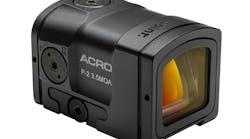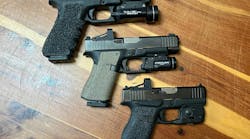In response to a new state law designed to prohibit them from destroying weapons they confiscate, some law enforcement agencies around the state are stockpiling arms that in the past they would have scrapped.
But the measure doesn't change how agencies in Yuma County have been dealing with the situation.
The Arizona Republic has reported that thousands of seized guns could be offered for sale or trade to licensed firearms dealers because of the new law and that some agencies are stockpiling weapons as they try to establish agreements with federally licensed firearms dealers that they can do business with.
Jan Schmitt, the evidence and identification supervisor at the Yuma Police Department, said the law, which went into effect in August, applies only to weapons that are forfeited to law enforcement agencies by court order after the owner has been convicted of a felony in which a deadly weapon was used.
While the law was meant to establish a uniform statewide police policy on the disposal of weapons collected through forfeiture cases, Schmitt said it does not apply to guns that law enforcement agencies procure through other means.
"The way the statute reads is that the mandated sale of guns only applies to guns that are forfeited as the result of a conviction. So other guns that are taken in, such as through a buy-back program or that go unclaimed, don't apply because they are not forfeited by the court," Schmitt said. "The way I look at the law is that law enforcement agency can do whatever they want with these guns because they don't fall under the statute."
State law previously attempted to mandate the sale of confiscated weapons, but it allowed Arizona cities and towns to turn their own police policies into municipal ordinances requiring the destruction of seized weapons.
Both Schmitt and Capt. Eben Bratcher of the Yuma County Sheriff's Office said their agencies have had ordinances and policies in place governing what to do with guns they confiscate well before the new law went into effect.
Peoria police, who have confiscated 49 guns since the legislation took effect and believe that 28 of the weapons may be eligible to be sold, expect to begin selling forfeited weapons within the year. Phoenix has collected more than 180 forfeited weapons since the law took effect, and police are storing them until city officials can find a vendor to whom the department can trade or sell the weapons.
Schmitt said of the 165 guns that Yuma police currently have that are cleared for auction, fewer than 10 have been forfeited by the court. While he didn't have an exact figure, Bratcher said the YCSO also has weapons that can be sold to a licensed firearms dealer at auction.
"We have guns that we will hold for a number of years due to circumstances, such as it still being evidence," Bratcher explained.
Bratcher and Schmitt said their agencies have policies that allow them to sell weapons, other than those forfeited by the court, to licensed firearm dealers. The only ones they don't sell, they explained, are ones that were used in a murder or have been modified in some way and as a result are no longer legal to own.
"The guns that are destroyed are guns that can't be sold because they have been altered in some way such as the barrel being too short, the serial number has been filed off or the firing rate has been changed," Schmitt said. "There are a number of reasons why you would not be able to possess these type of guns; even if you are a legal possessor, these guns just can't be owned anymore because they are illegal."
Schmitt said YPD generally holds one auction a year and that it is currently waiting for results from the National Integrated Ballistic Information System before it schedules a date for that auction. He explained that whenever YPD gets a gun, it must be cleared. To do this, it is fired three times and the casing is sent to NIBIS for entry into its database.
"Anytime they (NIBIS) get casings picked up from a crime scene, they enter them into their database and the data is stored. Basically they take a magnified picture of that casing and then a computer matches up certain characteristics on the cartridge to see if it was used in a crime," Schmitt said.
"So they take all my cartridges and enter them into the database and see if they match anything already there. Once they determine none of my guns match any casings on file, they tell me they are all cleared."
Once all the guns have been cleared, Schmitt said, he notifies the city purchasing agent, who issues an announcement seeking bids from licensed firearm dealers. The YCSO follows a similar procedure.
Some current and former law enforcement officers worry that the law forces police to put weapons back on the streets in communities where guns are already in abundant supply, and removes the latitude to make what should be a local decision.
Phoenix City Councilman Michael Johnson, a former police homicide detective whose district includes areas that have traditionally struggled with gun violence, said he wants Phoenix police to continue destroying weapons if that is what administrators believe is best.
"Certainly, from being a law enforcement officer and having the opportunity to investigate homicides and robberies and crimes involving the use of weapons, I'm just a firm believer that the more ability people have (to get a gun), the more opportunity it provides for them to have a violent encounter with a weapon," Johnson said.
Arizona House Minority Leader Chad Campbell, a Democrat from Phoenix who voted against the proposal, said he plans to introduce a proposal to repeal the bill as part of a gun violence package he will unveil later this week.
The Arizona Citizens Defense League, a nonprofit Tucson-based gun rights advocacy group that supported the measure, cites several reasons to support the notion that Arizona cities and towns cannot make their own decisions about the disposal of forfeited weapons.
The group's spokesman, Charles Heller, said destroying perfectly good weapons is a waste of resources that could benefit taxpayers. He also noted that Arizona cities aren't allowed to create their own ordinances when it comes to other weapons regulations.
Ultimately, destroying forfeited weapons does nothing to make a community safer, Heller said. "It's a (self-gratifying) process, thinking if you take a gun out of circulation that isn't being used, it will affect crime," Heller said.
The Associated Press contributed to this report.
Copyright 2013 - The Sun, Yuma, Ariz.
McClatchy-Tribune News Service


